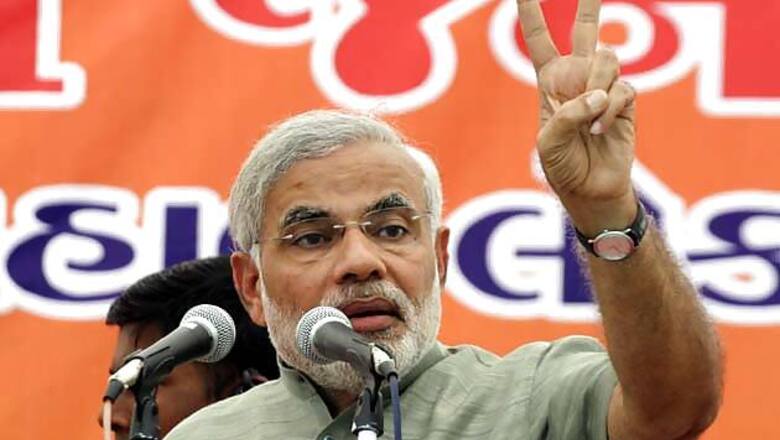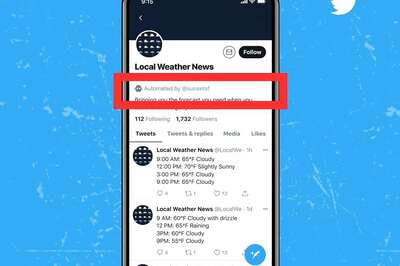
views
Ahmedabad: Gujarat Chief Minister Narendra Modi remains optimistic as the court of Metropolitan Magistrate MS Bhat in Ahmedabad is set to hear the Special Investigation Team's (SIT) closure report on the Gulbarg massacre during the 2002 riots. The court will also decide if activists Teesta Setalvad and Mukul Sinha can get a copy of the SIT report.
The Gujarat Chief Minister tweeted on Monday quoting Swami Vivekananda, "I stand for truth. Truth will never ally itself with falsehood."
He said that 'anti-Gujarat' forces cannot succeed in doing any harm. "There will be a storm in the form of criticism in the next 24 hours, but the anti-Gujarat forces will not be successful in doing any harm," Modi said at Ambaji, about 180 km from Ahmedabad, after his day-long Sadhbhavana fast on Sunday.
"Those who have been criticising Gujarat for the last one decade are going to come back to abuse us once again and this is because they cannot digest the success of Sadhbhavna that is peace, unity and harmony," Modi said.
In his speech, Modi also urged the 'anti-Gujarat forces' to accept that peace, harmony and brotherhood prevails in the state, and not to treat Gujaratis as people of an enemy state. He also told the 'anti-Gujarat forces' to do their politics outside Gujarat.
"They have done enough of salt rubbing into our wounds, but they cannot misguide the people of Gujarat. They cannot see Muslims, Christians and people of other religions working together. Few people who are against Gujarat are baffled by the success of Sadhbhavna," he said.
Sources have told CNN-IBN that the SIT has reportedly said there is no prosecutable evidence against Modi among others.
Sources have also said that the SIT report is over 1,000 pages with an additional trunk of material evidence. The SIT concluded its probe after examining 1,700 statements recorded by it. In April 2011, the SIT team headed by former CBI Chief RK Raghavan had submitted its report in a sealed envelope to the SC.
Zakia Jafri, widow of slain Congress MP Ehsan Jafri, approached Supreme Court in 2008 seeking a probe against Modi. In September 2011, the apex court refused to pass an order on Modi and directed the concerned Magistrate of Ahmedabad to decide the case.
Allegations on Modi say that he allowed the dead bodies of karsewaks killed in the Sabarmati express in Godhra to be brought to Ahmedabad. But according to sources the SIT says Modi's decision was justified as Godhra was more sensitive than Ahmedabad and that the hospitals in Godhra were not equipped for conducting the DNA test.
There were also allegations that Narendra Modi called the Army too late. The SIT report has used the fax sent by the Gujarat government to the Defence Ministry as its evidence.
Allegations against Modi also say that he knew about the threat to life of former Congress MP Ehsan Jafri but didn't take any action. However, the SIT didn't find any evidence of any call made by Jafri to the Chief Minister or the Ahmedabad Police Commissioner when the Gulbarg society was attacked. The SIT said that they went through several call records but couldn't find any confirmation of the allegation that Jafri sought protection from Modi.
The amicus curiae Raju Ramachandran appointed by the Supreme Court to look into the lapses of the SIT has agreed with it on the most of the findings and has concluded that there is no evidence against the Gujarat Chief Minister to prosecute him.
Sources have told CNN-IBN that on several issues the amicus curiae has also differed with the SIT.
While the allegation on Modi is that during the meeting held at the CM house, he had stated that the Muslims should be taught a lesson, the SIT says no such instruction was given by the Gujarat CM. Regarding the presence of IPS officer Sanjiv Bhatt, it says he wasn't present in the meeting. The amicus curiae has a different view regarding the meeting.
But the SIT report does throw up several embarrassing questions for Narendra Modi.
It says that despite ghastly violent attacks on Muslims in Gulbarg society and Naroda Patiya, the reaction of the government was not the type which would have been expected of anyone. The Chief Minister tried to water down the seriousness of the situation at Gulbarg society and Naroda Patiya by saying every action has an equal and opposite reaction. The report also criticises Modi for appointing pro-VHP advocates as public prosecutors in the riot cases.
Modi did not visit riot affected areas though he was at Godhra on February 27, 2002 and most damagingly for Modi, it says, the government destroyed wireless records of police conversation on February 27, 2002.
(With additional information from PTI)


















Comments
0 comment